#include <tree.hh>

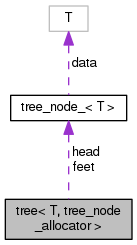
Classes | |
| class | breadth_first_queued_iterator |
| Breadth-first iterator, using a queue. More... | |
| class | fixed_depth_iterator |
| Iterator which traverses only the nodes at a given depth from the root. More... | |
| class | iterator_base |
| Base class for iterators, only pointers stored, no traversal logic. More... | |
| class | iterator_base_less |
| Comparator class for iterators (compares pointer values; why doesn't this work automatically?) More... | |
| class | leaf_iterator |
| Iterator which traverses only the leaves. More... | |
| class | post_order_iterator |
| Depth-first iterator, first accessing the children, then the node itself. More... | |
| class | pre_order_iterator |
| Depth-first iterator, first accessing the node, then its children. More... | |
| class | sibling_iterator |
| Iterator which traverses only the nodes which are siblings of each other. More... | |
Public Types | |
| typedef T | value_type |
| Value of the data stored at a node. More... | |
| typedef pre_order_iterator | iterator |
| The default iterator types throughout the tree class. More... | |
| typedef breadth_first_queued_iterator | breadth_first_iterator |
Public Member Functions | |
| tree () | |
| tree (const T &) | |
| tree (const iterator_base &) | |
| tree (const tree< T, tree_node_allocator > &) | |
| ~tree () | |
| void | operator= (const tree< T, tree_node_allocator > &) |
| pre_order_iterator | begin () const |
| Return iterator to the beginning of the tree. More... | |
| pre_order_iterator | end () const |
| Return iterator to the end of the tree. More... | |
| post_order_iterator | begin_post () const |
| Return post-order iterator to the beginning of the tree. More... | |
| post_order_iterator | end_post () const |
| Return post-order end iterator of the tree. More... | |
| fixed_depth_iterator | begin_fixed (const iterator_base &, unsigned int) const |
| Return fixed-depth iterator to the first node at a given depth from the given iterator. More... | |
| fixed_depth_iterator | end_fixed (const iterator_base &, unsigned int) const |
| Return fixed-depth end iterator. More... | |
| breadth_first_queued_iterator | begin_breadth_first () const |
| Return breadth-first iterator to the first node at a given depth. More... | |
| breadth_first_queued_iterator | end_breadth_first () const |
| Return breadth-first end iterator. More... | |
| sibling_iterator | begin (const iterator_base &) const |
| Return sibling iterator to the first child of given node. More... | |
| sibling_iterator | end (const iterator_base &) const |
| Return sibling end iterator for children of given node. More... | |
| leaf_iterator | begin_leaf () const |
| Return leaf iterator to the first leaf of the tree. More... | |
| leaf_iterator | end_leaf () const |
| Return leaf end iterator for entire tree. More... | |
| leaf_iterator | begin_leaf (const iterator_base &top) const |
| Return leaf iterator to the first leaf of the subtree at the given node. More... | |
| leaf_iterator | end_leaf (const iterator_base &top) const |
| Return leaf end iterator for the subtree at the given node. More... | |
| template<typename iter > | |
| iter | previous_sibling (iter) const |
| Return iterator to the previous sibling of a node. More... | |
| template<typename iter > | |
| iter | next_sibling (iter) const |
| Return iterator to the next sibling of a node. More... | |
| template<typename iter > | |
| iter | next_at_same_depth (iter) const |
| Return iterator to the next node at a given depth. More... | |
| void | clear () |
| Erase all nodes of the tree. More... | |
| template<typename iter > | |
| iter | erase (iter) |
| Erase element at position pointed to by iterator, return incremented iterator. More... | |
| void | erase_children (const iterator_base &) |
| Erase all children of the node pointed to by iterator. More... | |
| template<typename iter > | |
| iter | append_child (iter position) |
| Insert empty node as last/first child of node pointed to by position. More... | |
| template<typename iter > | |
| iter | prepend_child (iter position) |
| template<typename iter > | |
| iter | append_child (iter position, const T &x) |
| Insert node as last/first child of node pointed to by position. More... | |
| template<typename iter > | |
| iter | prepend_child (iter position, const T &x) |
| template<typename iter > | |
| iter | append_child (iter position, iter other_position) |
| Append the node (plus its children) at other_position as last/first child of position. More... | |
| template<typename iter > | |
| iter | prepend_child (iter position, iter other_position) |
| template<typename iter > | |
| iter | append_children (iter position, sibling_iterator from, sibling_iterator to) |
| Append the nodes in the from-to range (plus their children) as last/first children of position. More... | |
| template<typename iter > | |
| iter | prepend_children (iter position, sibling_iterator from, sibling_iterator to) |
| pre_order_iterator | set_head (const T &x) |
| Short-hand to insert topmost node in otherwise empty tree. More... | |
| template<typename iter > | |
| iter | insert (iter position, const T &x) |
| Insert node as previous sibling of node pointed to by position. More... | |
| sibling_iterator | insert (sibling_iterator position, const T &x) |
| Specialisation of previous member. More... | |
| template<typename iter > | |
| iter | insert_subtree (iter position, const iterator_base &subtree) |
| Insert node (with children) pointed to by subtree as previous sibling of node pointed to by position. More... | |
| template<typename iter > | |
| iter | insert_after (iter position, const T &x) |
| Insert node as next sibling of node pointed to by position. More... | |
| template<typename iter > | |
| iter | insert_subtree_after (iter position, const iterator_base &subtree) |
| Insert node (with children) pointed to by subtree as next sibling of node pointed to by position. More... | |
| template<typename iter > | |
| iter | replace (iter position, const T &x) |
| Replace node at 'position' with other node (keeping same children); 'position' becomes invalid. More... | |
| template<typename iter > | |
| iter | replace (iter position, const iterator_base &from) |
| Replace node at 'position' with subtree starting at 'from' (do not erase subtree at 'from'); see above. More... | |
| sibling_iterator | replace (sibling_iterator orig_begin, sibling_iterator orig_end, sibling_iterator new_begin, sibling_iterator new_end) |
| Replace string of siblings (plus their children) with copy of a new string (with children); see above. More... | |
| template<typename iter > | |
| iter | flatten (iter position) |
| Move all children of node at 'position' to be siblings, returns position. More... | |
| template<typename iter > | |
| iter | reparent (iter position, sibling_iterator begin, sibling_iterator end) |
| Move nodes in range to be children of 'position'. More... | |
| template<typename iter > | |
| iter | reparent (iter position, iter from) |
| Move all child nodes of 'from' to be children of 'position'. More... | |
| template<typename iter > | |
| iter | wrap (iter position, const T &x) |
| Replace node with a new node, making the old node a child of the new node. More... | |
| template<typename iter > | |
| iter | move_after (iter target, iter source) |
| Move 'source' node (plus its children) to become the next sibling of 'target'. More... | |
| template<typename iter > | |
| iter | move_before (iter target, iter source) |
| Move 'source' node (plus its children) to become the previous sibling of 'target'. More... | |
| sibling_iterator | move_before (sibling_iterator target, sibling_iterator source) |
| template<typename iter > | |
| iter | move_ontop (iter target, iter source) |
| Move 'source' node (plus its children) to become the node at 'target' (erasing the node at 'target'). More... | |
| void | merge (sibling_iterator, sibling_iterator, sibling_iterator, sibling_iterator, bool duplicate_leaves=false) |
| Merge with other tree, creating new branches and leaves only if they are not already present. More... | |
| void | sort (sibling_iterator from, sibling_iterator to, bool deep=false) |
| Sort (std::sort only moves values of nodes, this one moves children as well). More... | |
| template<class StrictWeakOrdering > | |
| void | sort (sibling_iterator from, sibling_iterator to, StrictWeakOrdering comp, bool deep=false) |
| template<typename iter > | |
| bool | equal (const iter &one, const iter &two, const iter &three) const |
| Compare two ranges of nodes (compares nodes as well as tree structure). More... | |
| template<typename iter , class BinaryPredicate > | |
| bool | equal (const iter &one, const iter &two, const iter &three, BinaryPredicate) const |
| template<typename iter > | |
| bool | equal_subtree (const iter &one, const iter &two) const |
| template<typename iter , class BinaryPredicate > | |
| bool | equal_subtree (const iter &one, const iter &two, BinaryPredicate) const |
| tree | subtree (sibling_iterator from, sibling_iterator to) const |
| Extract a new tree formed by the range of siblings plus all their children. More... | |
| void | subtree (tree &, sibling_iterator from, sibling_iterator to) const |
| void | swap (sibling_iterator it) |
| Exchange the node (plus subtree) with its sibling node (do nothing if no sibling present). More... | |
| void | swap (iterator, iterator) |
| Exchange two nodes (plus subtrees) More... | |
| size_t | size () const |
| Count the total number of nodes. More... | |
| size_t | size (const iterator_base &) const |
| Count the total number of nodes below the indicated node (plus one). More... | |
| bool | empty () const |
| Check if tree is empty. More... | |
| int | max_depth () const |
| Determine the maximal depth of the tree. An empty tree has max_depth=-1. More... | |
| int | max_depth (const iterator_base &) const |
| Determine the maximal depth of the tree with top node at the given position. More... | |
| unsigned int | number_of_siblings (const iterator_base &) const |
| Count the number of siblings (left and right) of node at iterator. Total nodes at this level is +1. More... | |
| bool | is_in_subtree (const iterator_base &position, const iterator_base &begin, const iterator_base &end) const |
| Determine whether node at position is in the subtrees with root in the range. More... | |
| bool | is_valid (const iterator_base &) const |
| Determine whether the iterator is an 'end' iterator and thus not actually pointing to a node. More... | |
| unsigned int | index (sibling_iterator it) const |
| Determine the index of a node in the range of siblings to which it belongs. More... | |
| sibling_iterator | sibling (const iterator_base &position, unsigned int) |
| Return iterator to the sibling indicated by index. More... | |
Static Public Member Functions | |
| template<typename iter > | |
| static iter | parent (iter) |
| Return iterator to the parent of a node. More... | |
| static int | depth (const iterator_base &) |
| Compute the depth to the root or to a fixed other iterator. More... | |
| static int | depth (const iterator_base &, const iterator_base &) |
| static unsigned int | number_of_children (const iterator_base &) |
| Count the number of children of node at position. More... | |
| static sibling_iterator | child (const iterator_base &position, unsigned int) |
| Inverse of 'index': return the n-th child of the node at position. More... | |
Public Attributes | |
| tree_node * | head |
| tree_node * | feet |
Protected Types | |
| typedef tree_node_< T > | tree_node |
Member Typedef Documentation
◆ breadth_first_iterator
| typedef breadth_first_queued_iterator tree< T, tree_node_allocator >::breadth_first_iterator |
◆ iterator
| typedef pre_order_iterator tree< T, tree_node_allocator >::iterator |
The default iterator types throughout the tree class.
◆ tree_node
|
protected |
◆ value_type
| typedef T tree< T, tree_node_allocator >::value_type |
Value of the data stored at a node.
Constructor & Destructor Documentation
◆ tree() [1/4]
◆ tree() [2/4]
◆ tree() [3/4]
| tree< T, tree_node_allocator >::tree | ( | const iterator_base & | other | ) |
◆ tree() [4/4]
| tree< T, tree_node_allocator >::tree | ( | const tree< T, tree_node_allocator > & | other | ) |
◆ ~tree()
Member Function Documentation
◆ append_child() [1/3]
| iter tree< T, tree_node_allocator >::append_child | ( | iter | position | ) |
Insert empty node as last/first child of node pointed to by position.
Referenced by FilterTree::addFilter(), FilterTree::addFilterTree(), FilterTree::copyFilter(), FilterTree::loadXML(), and FilterTree::reparentFilter().
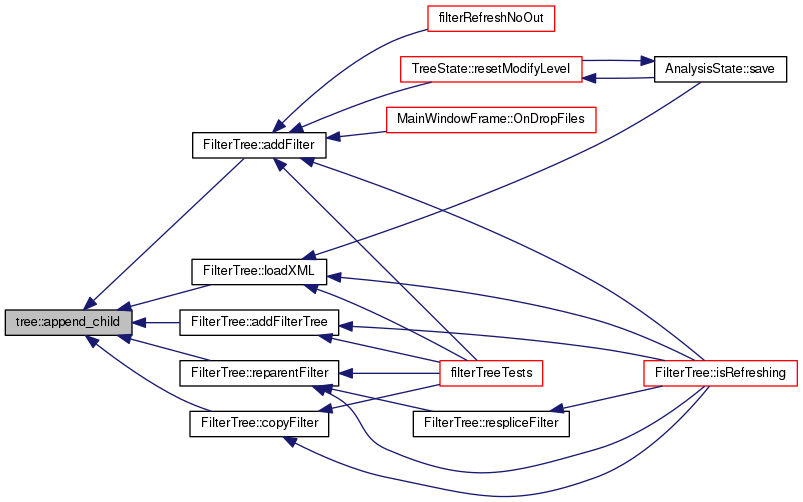
◆ append_child() [2/3]
| iter tree< T, tree_node_allocator >::append_child | ( | iter | position, |
| const T & | x | ||
| ) |
Insert node as last/first child of node pointed to by position.
◆ append_child() [3/3]
| iter tree< T, tree_node_allocator >::append_child | ( | iter | position, |
| iter | other_position | ||
| ) |
Append the node (plus its children) at other_position as last/first child of position.
◆ append_children()
| iter tree< T, tree_node_allocator >::append_children | ( | iter | position, |
| sibling_iterator | from, | ||
| sibling_iterator | to | ||
| ) |
Append the nodes in the from-to range (plus their children) as last/first children of position.
◆ begin() [1/2]
|
inline |
Return iterator to the beginning of the tree.
Referenced by FilterTree::addFilter(), FilterTree::addFilterTree(), FilterTreeAnalyse::analyse(), FilterTree::cacheCount(), FilterTree::clear(), FilterTree::clearCache(), FilterTree::clearCacheByType(), FilterTree::cloneSubtree(), FilterTree::contains(), FilterTree::copyFilter(), FilterTree::depth(), FilterTree::depthBegin(), filterAffectedByComposition(), filterAltersComposition(), FilterTree::FilterTree(), FilterTree::getAccumulatedPropagationMaps(), FilterTree::getFiltersByType(), FilterTree::hasHazardousContents(), FilterTree::hasStateOverrides(), FilterTree::hasUpdates(), FilterTree::initFilterTree(), FilterTree::loadXML(), FilterTree::modifyRangeFiles(), FilterTree::operator=(), FilterTree::purgeCache(), FilterTree::refreshFilterTree(), FilterTree::removeSubtree(), FilterTree::reparentFilter(), FilterTree::respliceFilter(), FilterTree::saveXML(), FilterTree::serialiseToStringPaths(), FilterTree::setFilterProperty(), FilterTree::stripHazardousContents(), tree< Filter *>::subtree(), and tree< Filter *>::tree().
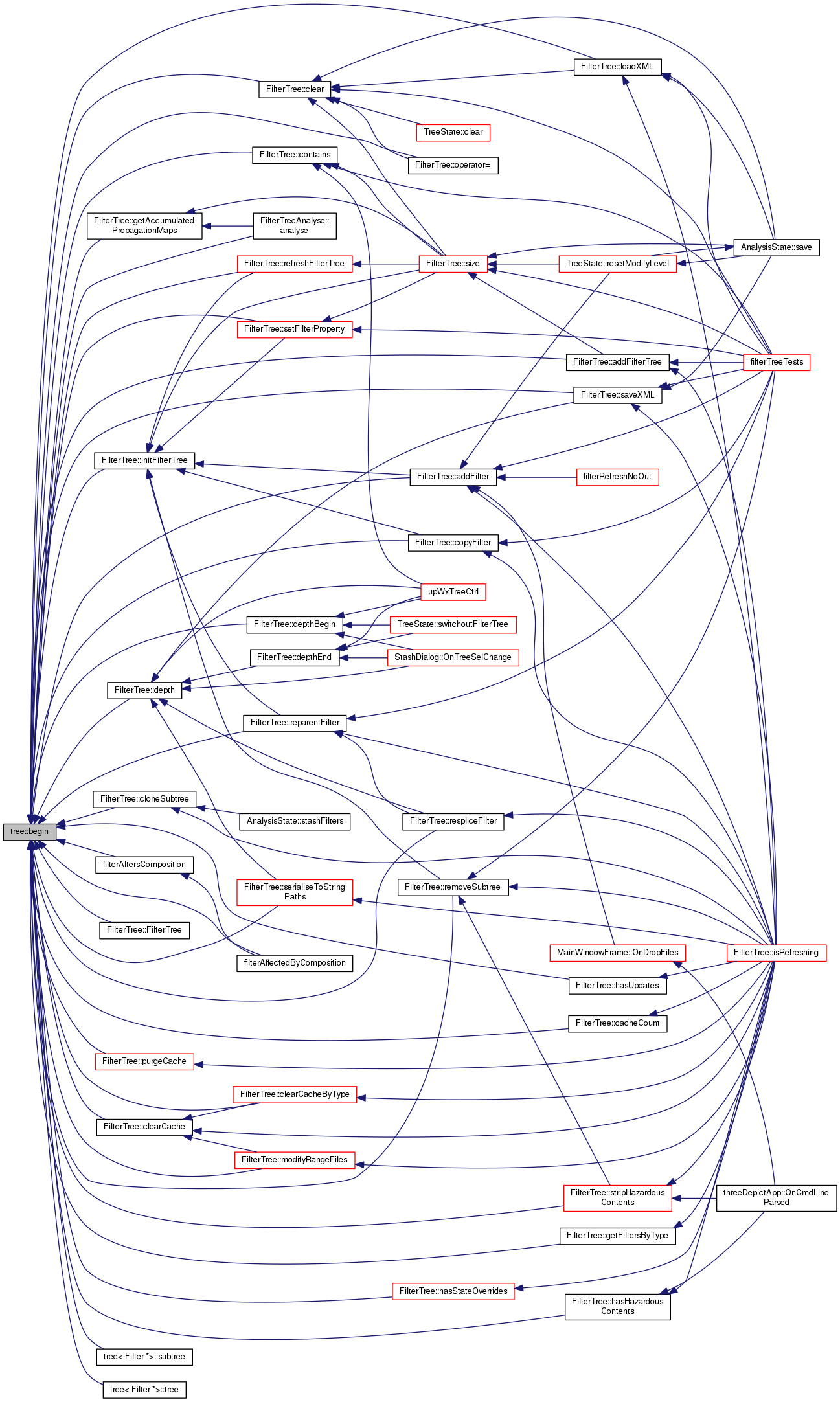
◆ begin() [2/2]
| tree< T, tree_node_allocator >::sibling_iterator tree< T, tree_node_allocator >::begin | ( | const iterator_base & | pos | ) | const |
Return sibling iterator to the first child of given node.
◆ begin_breadth_first()
| tree< T, tree_node_allocator >::breadth_first_queued_iterator tree< T, tree_node_allocator >::begin_breadth_first | ( | ) | const |
Return breadth-first iterator to the first node at a given depth.
Referenced by FilterTree::getAccumulatedPropagationMaps().

◆ begin_fixed()
| tree< T, tree_node_allocator >::fixed_depth_iterator tree< T, tree_node_allocator >::begin_fixed | ( | const iterator_base & | pos, |
| unsigned int | dp | ||
| ) | const |
Return fixed-depth iterator to the first node at a given depth from the given iterator.
◆ begin_leaf() [1/2]
| tree< T, tree_node_allocator >::leaf_iterator tree< T, tree_node_allocator >::begin_leaf | ( | ) | const |
Return leaf iterator to the first leaf of the tree.
Referenced by FilterTree::getAccumulatedPropagationMaps(), and FilterTree::refreshFilterTree().
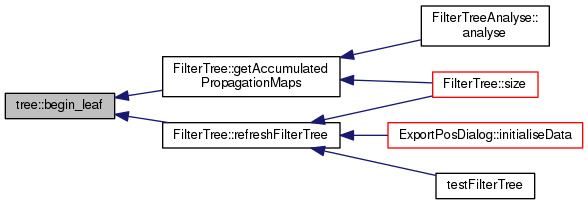
◆ begin_leaf() [2/2]
| tree< T, tree_node_allocator >::leaf_iterator tree< T, tree_node_allocator >::begin_leaf | ( | const iterator_base & | top | ) | const |
Return leaf iterator to the first leaf of the subtree at the given node.
◆ begin_post()
| tree< T, tree_node_allocator >::post_order_iterator tree< T, tree_node_allocator >::begin_post | ( | ) | const |
Return post-order iterator to the beginning of the tree.
◆ child()
|
static |
Inverse of 'index': return the n-th child of the node at position.
◆ clear()
| void tree< T, tree_node_allocator >::clear | ( | ) |
Erase all nodes of the tree.
Referenced by FilterTree::addFilterTree(), and FilterTree::clear().
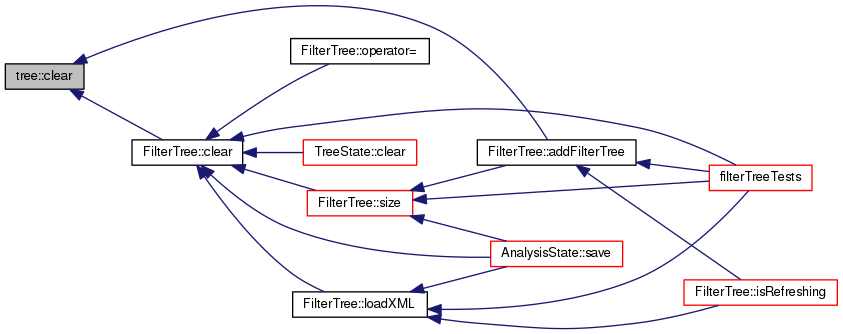
◆ depth() [1/2]
|
static |
Compute the depth to the root or to a fixed other iterator.
Referenced by FilterTreeAnalyse::analyse(), FilterTree::clearCache(), FilterTree::depth(), filterAffectedByComposition(), FilterTree::getAccumulatedPropagationMaps(), FilterTree::initFilterTree(), FilterTree::refreshFilterTree(), FilterTree::removeSubtree(), FilterTree::reparentFilter(), FilterTree::saveXML(), FilterTree::setFilterProperty(), and FilterTree::stripHazardousContents().
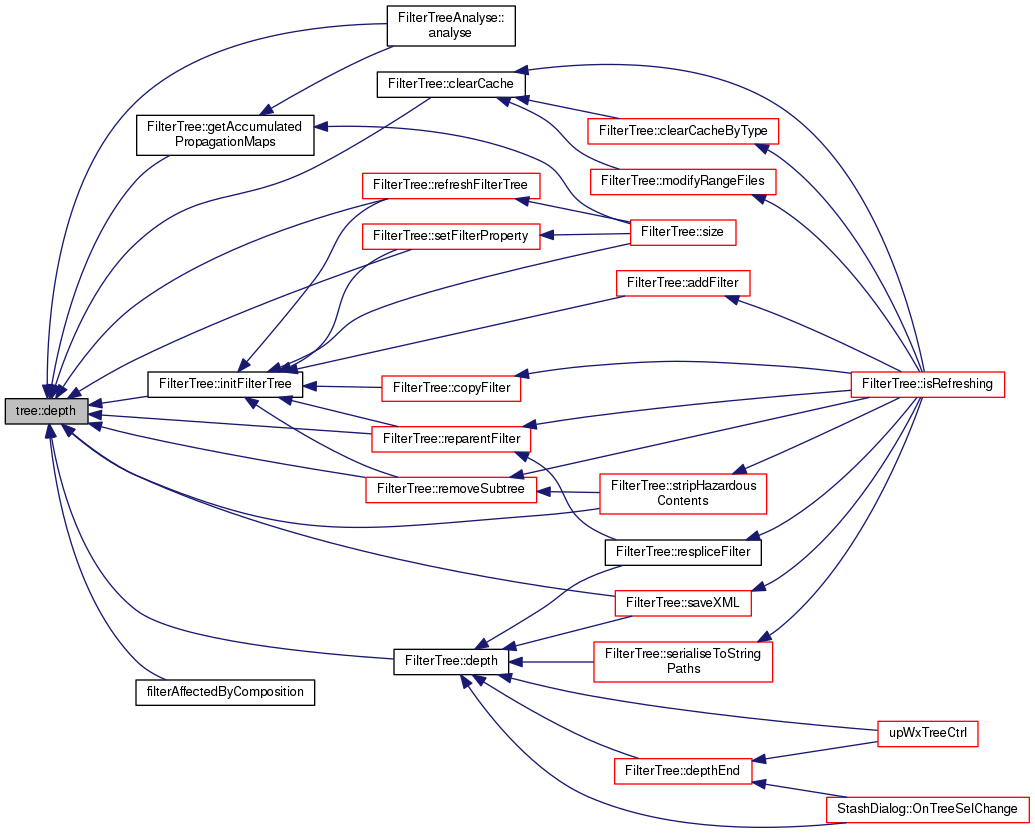
◆ depth() [2/2]
|
static |
◆ empty()
| bool tree< T, tree_node_allocator >::empty | ( | ) | const |
Check if tree is empty.
Referenced by FilterTree::addFilter(), FilterTree::addFilterTree(), and FilterTree::loadXML().
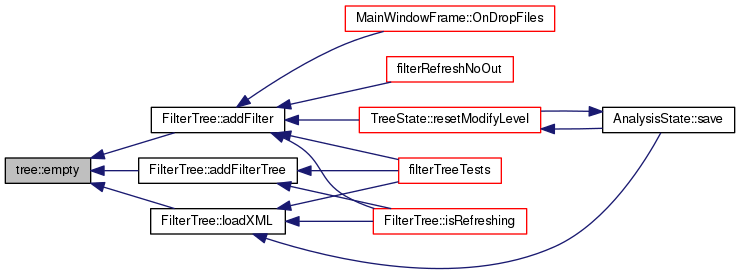
◆ end() [1/2]
|
inline |
Return iterator to the end of the tree.
Referenced by FilterTree::addFilter(), FilterTree::addFilterTree(), FilterTreeAnalyse::analyse(), FilterTree::cacheCount(), FilterTree::clear(), FilterTree::clearCache(), FilterTree::clearCacheByType(), FilterTree::cloneSubtree(), FilterTree::contains(), FilterTree::copyFilter(), FilterTree::depth(), FilterTree::depthEnd(), filterAffectedByComposition(), filterAltersComposition(), FilterTree::FilterTree(), FilterTree::getAccumulatedPropagationMaps(), FilterTree::getFiltersByType(), FilterTree::hasHazardousContents(), FilterTree::hasStateOverrides(), FilterTree::hasUpdates(), FilterTree::initFilterTree(), FilterTree::modifyRangeFiles(), FilterTree::operator=(), FilterTree::purgeCache(), FilterTree::refreshFilterTree(), FilterTree::removeSubtree(), FilterTree::reparentFilter(), FilterTree::respliceFilter(), FilterTree::saveXML(), FilterTree::serialiseToStringPaths(), FilterTree::setFilterProperty(), FilterTree::stripHazardousContents(), tree< Filter *>::subtree(), and tree< Filter *>::tree().
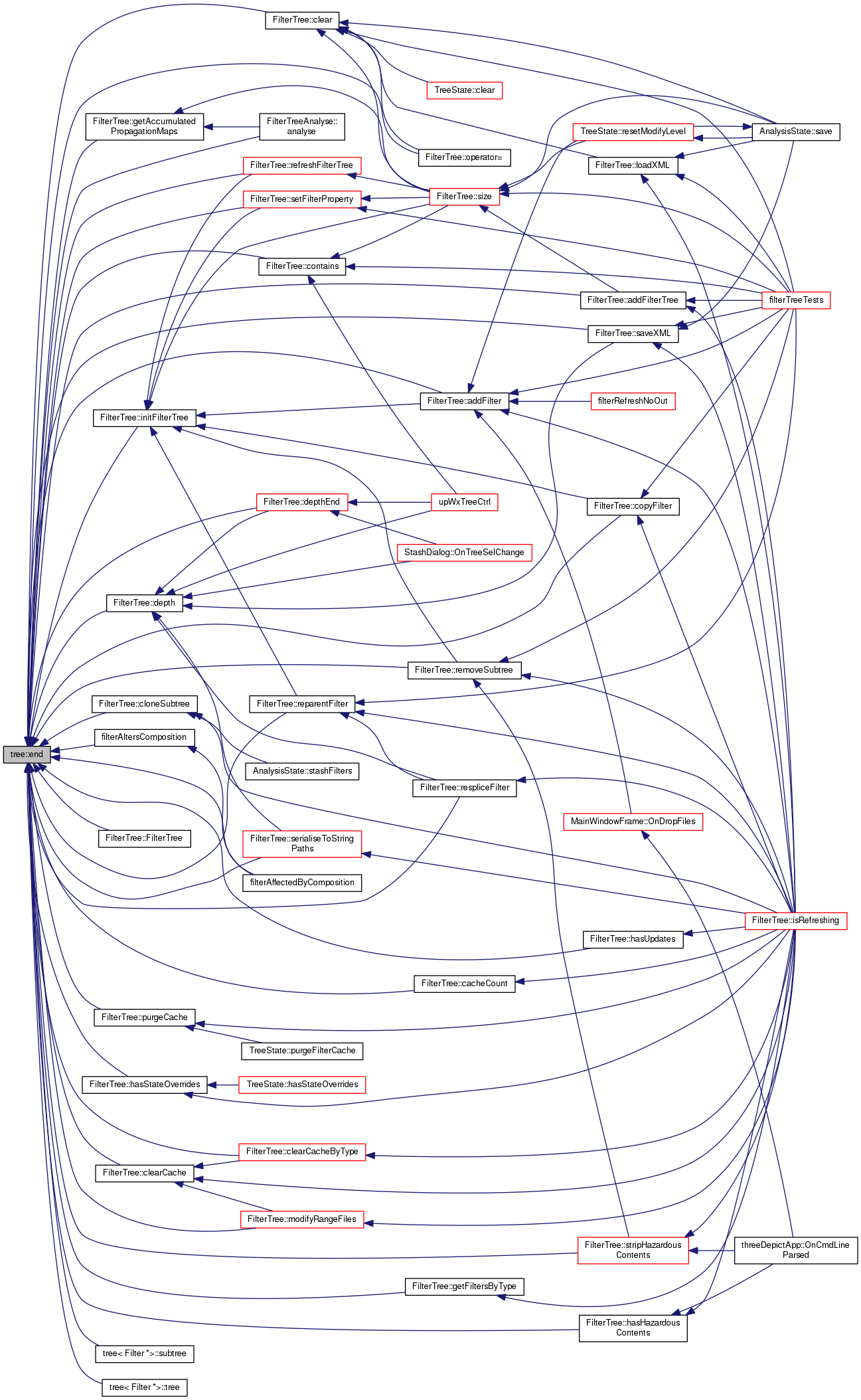
◆ end() [2/2]
| tree< T, tree_node_allocator >::sibling_iterator tree< T, tree_node_allocator >::end | ( | const iterator_base & | pos | ) | const |
Return sibling end iterator for children of given node.
◆ end_breadth_first()
| tree< T, tree_node_allocator >::breadth_first_queued_iterator tree< T, tree_node_allocator >::end_breadth_first | ( | ) | const |
Return breadth-first end iterator.
Referenced by FilterTree::getAccumulatedPropagationMaps().

◆ end_fixed()
| tree< T, tree_node_allocator >::fixed_depth_iterator tree< T, tree_node_allocator >::end_fixed | ( | const iterator_base & | pos, |
| unsigned int | dp | ||
| ) | const |
Return fixed-depth end iterator.
◆ end_leaf() [1/2]
| tree< T, tree_node_allocator >::leaf_iterator tree< T, tree_node_allocator >::end_leaf | ( | ) | const |
Return leaf end iterator for entire tree.
Referenced by FilterTree::getAccumulatedPropagationMaps(), and FilterTree::refreshFilterTree().
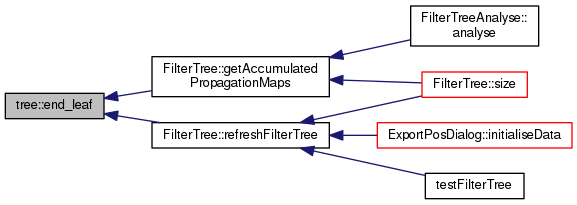
◆ end_leaf() [2/2]
| tree< T, tree_node_allocator >::leaf_iterator tree< T, tree_node_allocator >::end_leaf | ( | const iterator_base & | top | ) | const |
Return leaf end iterator for the subtree at the given node.
◆ end_post()
| tree< T, tree_node_allocator >::post_order_iterator tree< T, tree_node_allocator >::end_post | ( | ) | const |
Return post-order end iterator of the tree.
◆ equal() [1/2]
| bool tree< T, tree_node_allocator >::equal | ( | const iter & | one, |
| const iter & | two, | ||
| const iter & | three | ||
| ) | const |
Compare two ranges of nodes (compares nodes as well as tree structure).
◆ equal() [2/2]
| bool tree< T, tree_node_allocator >::equal | ( | const iter & | one, |
| const iter & | two, | ||
| const iter & | three, | ||
| BinaryPredicate | fun | ||
| ) | const |
◆ equal_subtree() [1/2]
| bool tree< T, tree_node_allocator >::equal_subtree | ( | const iter & | one, |
| const iter & | two | ||
| ) | const |
◆ equal_subtree() [2/2]
| bool tree< T, tree_node_allocator >::equal_subtree | ( | const iter & | one, |
| const iter & | two, | ||
| BinaryPredicate | fun | ||
| ) | const |
◆ erase()
| iter tree< T, tree_node_allocator >::erase | ( | iter | it | ) |
Erase element at position pointed to by iterator, return incremented iterator.
Referenced by FilterTree::addFilterTree(), FilterTree::removeSubtree(), and FilterTree::reparentFilter().
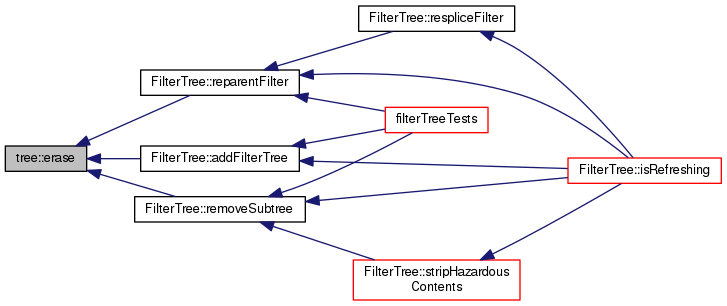
◆ erase_children()
| void tree< T, tree_node_allocator >::erase_children | ( | const iterator_base & | it | ) |
Erase all children of the node pointed to by iterator.
Referenced by FilterTree::removeSubtree().

◆ flatten()
| iter tree< T, tree_node_allocator >::flatten | ( | iter | position | ) |
Move all children of node at 'position' to be siblings, returns position.
◆ index()
| unsigned int tree< T, tree_node_allocator >::index | ( | sibling_iterator | it | ) | const |
Determine the index of a node in the range of siblings to which it belongs.
◆ insert() [1/2]
| iter tree< T, tree_node_allocator >::insert | ( | iter | position, |
| const T & | x | ||
| ) |
Insert node as previous sibling of node pointed to by position.
Referenced by FilterTree::addFilter(), FilterTree::cloneSubtree(), FilterTree::copyFilter(), and FilterTree::loadXML().
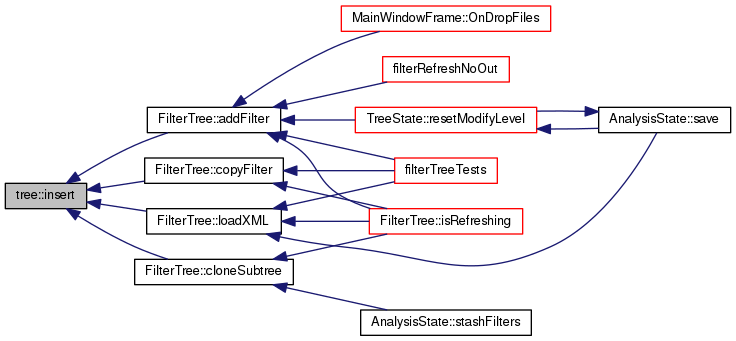
◆ insert() [2/2]
| tree< T, tree_node_allocator >::sibling_iterator tree< T, tree_node_allocator >::insert | ( | sibling_iterator | position, |
| const T & | x | ||
| ) |
Specialisation of previous member.
◆ insert_after()
| iter tree< T, tree_node_allocator >::insert_after | ( | iter | position, |
| const T & | x | ||
| ) |
Insert node as next sibling of node pointed to by position.
Referenced by FilterTree::addFilter(), FilterTree::copyFilter(), and FilterTree::reparentFilter().
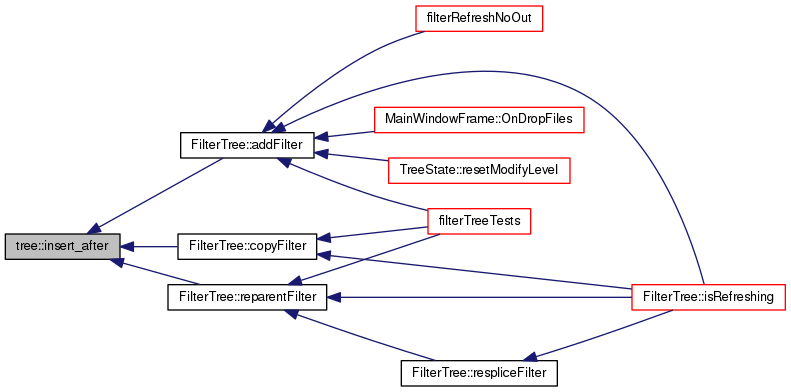
◆ insert_subtree()
| iter tree< T, tree_node_allocator >::insert_subtree | ( | iter | position, |
| const iterator_base & | subtree | ||
| ) |
Insert node (with children) pointed to by subtree as previous sibling of node pointed to by position.
Referenced by FilterTree::addFilterTree().

◆ insert_subtree_after()
| iter tree< T, tree_node_allocator >::insert_subtree_after | ( | iter | position, |
| const iterator_base & | subtree | ||
| ) |
Insert node (with children) pointed to by subtree as next sibling of node pointed to by position.
Referenced by FilterTree::addFilterTree().

◆ is_in_subtree()
| bool tree< T, tree_node_allocator >::is_in_subtree | ( | const iterator_base & | position, |
| const iterator_base & | begin, | ||
| const iterator_base & | end | ||
| ) | const |
Determine whether node at position is in the subtrees with root in the range.
◆ is_valid()
| bool tree< T, tree_node_allocator >::is_valid | ( | const iterator_base & | it | ) | const |
Determine whether the iterator is an 'end' iterator and thus not actually pointing to a node.
Referenced by FilterTree::getAccumulatedPropagationMaps().

◆ max_depth() [1/2]
| int tree< T, tree_node_allocator >::max_depth | ( | ) | const |
Determine the maximal depth of the tree. An empty tree has max_depth=-1.
Referenced by FilterTree::getAccumulatedPropagationMaps(), and FilterTree::maxDepth().

◆ max_depth() [2/2]
| int tree< T, tree_node_allocator >::max_depth | ( | const iterator_base & | pos | ) | const |
Determine the maximal depth of the tree with top node at the given position.
◆ merge()
| void tree< T, tree_node_allocator >::merge | ( | sibling_iterator | to1, |
| sibling_iterator | to2, | ||
| sibling_iterator | from1, | ||
| sibling_iterator | from2, | ||
| bool | duplicate_leaves = false |
||
| ) |
Merge with other tree, creating new branches and leaves only if they are not already present.
◆ move_after()
| iter tree< T, tree_node_allocator >::move_after | ( | iter | target, |
| iter | source | ||
| ) |
Move 'source' node (plus its children) to become the next sibling of 'target'.
◆ move_before() [1/2]
| iter tree< T, tree_node_allocator >::move_before | ( | iter | target, |
| iter | source | ||
| ) |
Move 'source' node (plus its children) to become the previous sibling of 'target'.
◆ move_before() [2/2]
| tree< T, tree_node_allocator >::sibling_iterator tree< T, tree_node_allocator >::move_before | ( | sibling_iterator | target, |
| sibling_iterator | source | ||
| ) |
◆ move_ontop()
| iter tree< T, tree_node_allocator >::move_ontop | ( | iter | target, |
| iter | source | ||
| ) |
Move 'source' node (plus its children) to become the node at 'target' (erasing the node at 'target').
◆ next_at_same_depth()
| iter tree< T, tree_node_allocator >::next_at_same_depth | ( | iter | position | ) | const |
Return iterator to the next node at a given depth.
◆ next_sibling()
| iter tree< T, tree_node_allocator >::next_sibling | ( | iter | position | ) | const |
Return iterator to the next sibling of a node.
◆ number_of_children()
|
static |
Count the number of children of node at position.
◆ number_of_siblings()
| unsigned int tree< T, tree_node_allocator >::number_of_siblings | ( | const iterator_base & | it | ) | const |
Count the number of siblings (left and right) of node at iterator. Total nodes at this level is +1.
◆ operator=()
| void tree< T, tree_node_allocator >::operator= | ( | const tree< T, tree_node_allocator > & | other | ) |
◆ parent()
|
static |
Return iterator to the parent of a node.
Referenced by FilterTreeAnalyse::analyse(), FilterTree::getAccumulatedPropagationMaps(), FilterTree::respliceFilter(), FilterTree::stripHazardousContents(), and tree< Filter *>::~tree().
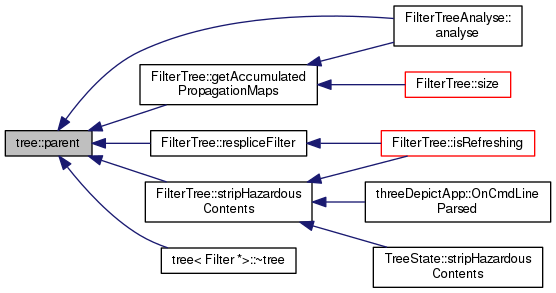
◆ prepend_child() [1/3]
| iter tree< T, tree_node_allocator >::prepend_child | ( | iter | position | ) |
◆ prepend_child() [2/3]
| iter tree< T, tree_node_allocator >::prepend_child | ( | iter | position, |
| const T & | x | ||
| ) |
◆ prepend_child() [3/3]
| iter tree< T, tree_node_allocator >::prepend_child | ( | iter | position, |
| iter | other_position | ||
| ) |
◆ prepend_children()
| iter tree< T, tree_node_allocator >::prepend_children | ( | iter | position, |
| sibling_iterator | from, | ||
| sibling_iterator | to | ||
| ) |
◆ previous_sibling()
| iter tree< T, tree_node_allocator >::previous_sibling | ( | iter | position | ) | const |
Return iterator to the previous sibling of a node.
◆ reparent() [1/2]
| iter tree< T, tree_node_allocator >::reparent | ( | iter | position, |
| sibling_iterator | begin, | ||
| sibling_iterator | end | ||
| ) |
Move nodes in range to be children of 'position'.
◆ reparent() [2/2]
| iter tree< T, tree_node_allocator >::reparent | ( | iter | position, |
| iter | from | ||
| ) |
Move all child nodes of 'from' to be children of 'position'.
◆ replace() [1/3]
| iter tree< T, tree_node_allocator >::replace | ( | iter | position, |
| const T & | x | ||
| ) |
Replace node at 'position' with other node (keeping same children); 'position' becomes invalid.
Referenced by FilterTree::cloneSubtree(), FilterTree::copyFilter(), FilterTree::reparentFilter(), and tree< Filter *>::subtree().
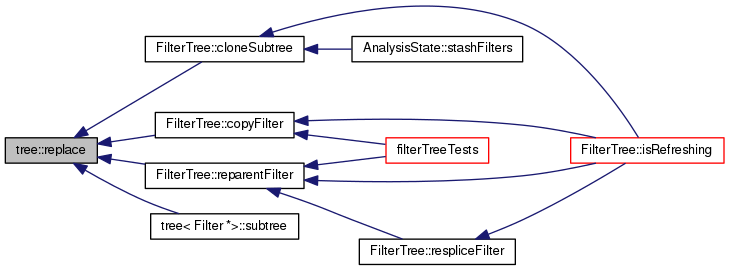
◆ replace() [2/3]
| iter tree< T, tree_node_allocator >::replace | ( | iter | position, |
| const iterator_base & | from | ||
| ) |
Replace node at 'position' with subtree starting at 'from' (do not erase subtree at 'from'); see above.
◆ replace() [3/3]
| tree< T, tree_node_allocator >::sibling_iterator tree< T, tree_node_allocator >::replace | ( | sibling_iterator | orig_begin, |
| sibling_iterator | orig_end, | ||
| sibling_iterator | new_begin, | ||
| sibling_iterator | new_end | ||
| ) |
Replace string of siblings (plus their children) with copy of a new string (with children); see above.
◆ set_head()
| tree< T, tree_node_allocator >::pre_order_iterator tree< T, tree_node_allocator >::set_head | ( | const T & | x | ) |
Short-hand to insert topmost node in otherwise empty tree.
Referenced by tree< Filter *>::subtree().

◆ sibling()
| tree< T, tree_node_allocator >::sibling_iterator tree< T, tree_node_allocator >::sibling | ( | const iterator_base & | position, |
| unsigned int | num | ||
| ) |
Return iterator to the sibling indicated by index.
◆ size() [1/2]
| size_t tree< T, tree_node_allocator >::size | ( | ) | const |
Count the total number of nodes.
Referenced by FilterTree::cloneSubtree(), FilterTree::getAccumulatedPropagationMaps(), FilterTree::loadXML(), FilterTree::refreshFilterTree(), FilterTree::serialiseToStringPaths(), and FilterTree::size().
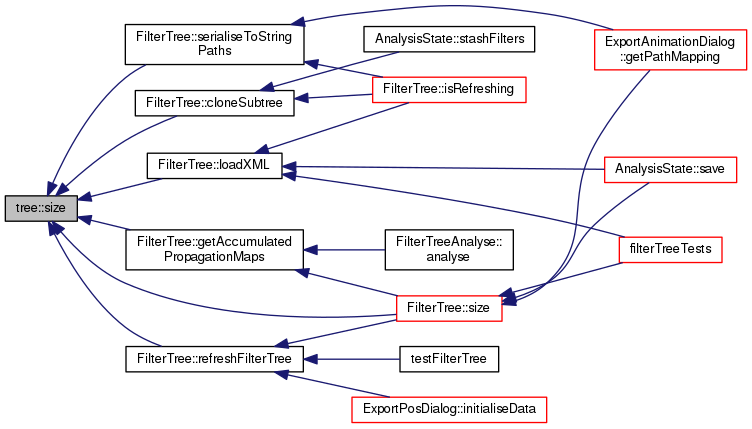
◆ size() [2/2]
| size_t tree< T, tree_node_allocator >::size | ( | const iterator_base & | top | ) | const |
Count the total number of nodes below the indicated node (plus one).
◆ sort() [1/2]
| void tree< T, tree_node_allocator >::sort | ( | sibling_iterator | from, |
| sibling_iterator | to, | ||
| bool | deep = false |
||
| ) |
Sort (std::sort only moves values of nodes, this one moves children as well).
◆ sort() [2/2]
| void tree< T, tree_node_allocator >::sort | ( | sibling_iterator | from, |
| sibling_iterator | to, | ||
| StrictWeakOrdering | comp, | ||
| bool | deep = false |
||
| ) |
◆ subtree() [1/2]
| tree< T, tree_node_allocator > tree< T, tree_node_allocator >::subtree | ( | sibling_iterator | from, |
| sibling_iterator | to | ||
| ) | const |
Extract a new tree formed by the range of siblings plus all their children.
◆ subtree() [2/2]
| void tree< T, tree_node_allocator >::subtree | ( | tree< T, tree_node_allocator > & | tmp, |
| sibling_iterator | from, | ||
| sibling_iterator | to | ||
| ) | const |
◆ swap() [1/2]
| void tree< T, tree_node_allocator >::swap | ( | sibling_iterator | it | ) |
Exchange the node (plus subtree) with its sibling node (do nothing if no sibling present).
◆ swap() [2/2]
| void tree< T, tree_node_allocator >::swap | ( | iterator | one, |
| iterator | two | ||
| ) |
Exchange two nodes (plus subtrees)
◆ wrap()
| iter tree< T, tree_node_allocator >::wrap | ( | iter | position, |
| const T & | x | ||
| ) |
Replace node with a new node, making the old node a child of the new node.
Member Data Documentation
◆ feet
| tree_node * tree< T, tree_node_allocator >::feet |
◆ head
| tree_node* tree< T, tree_node_allocator >::head |
The documentation for this class was generated from the following file:
 1.8.13
1.8.13